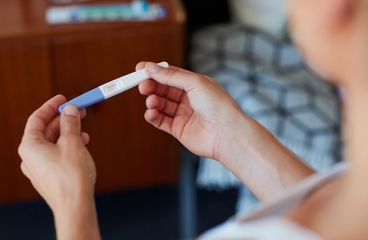Overview

Early pregnancy is the first 10 weeks of pregnancy. Pregnancy begins when your egg joins with a sperm (fertilization) and attaches to the lining of your uterus. You may start noticing signs as early as 5 weeks. You may start to feel different in your body and your emotions.
In early pregnancy, your body goes through many changes. You might feel different than you're used to. Early signs of pregnancy often happen suddenly. You may notice them every day. The most common early signs include:
- A missed period.
- Nausea with or without vomiting. This is often called morning sickness, but it can happen at any time of the day.
- Breast changes. Your breasts may be swollen or tender.
- Needing to urinate more often.
- Feeling more tired than usual.
There are some symptoms that you'll want to look out for. Talk with your doctor if you have any of these symptoms:
- Vaginal bleeding
- Pain in your pelvis, especially if it's only on one side
- Belly pain
- Pain when you urinate
- Blood in your urine
When to take a pregnancy test
Exactly when you can take a pregnancy test with accurate results depends on how far into your pregnancy you are. And it depends on which type of test you choose.
When you're pregnant, your body makes a hormone called human chorionic gonadotropin (hCG). In the first 30 days of pregnancy, hCG increases every day. Pregnancy tests measure hCG. These tests include:
- Home pregnancy test (HPT). It's best to take this test at least 1 to 2 weeks after a missed period. Taking it earlier could give you a false negative result. That's because levels of hCG in your urine may be too low for the test to find.
- Blood pregnancy test. This test can give you results as early as 6 to 8 days after you ovulate. Blood tests detect low levels of hCG in your body. They may show a positive result early during pregnancy, when a home test shows a negative result.
How pregnancy tests are done
Pregnancy tests use a sample of your urine or blood to know if you're pregnant. Here's how the different tests are done:
- Home pregnancy test (HPT).
This type of test uses a urine sample. It's done by holding a test stick in your urine stream. Or you may collect urine in a cup and dip the test stick into it. Results are shown in a few minutes. They'll be displayed by colored bands, symbols, or words in the window of the device. Follow the instructions for the type of test you're using.
Tip: Taking a urine sample first thing in the morning may give you the most accurate result.
- Blood pregnancy test.
A blood sample is taken at your doctor's office. The results can tell you if hCG is present or not. Or they can tell you exactly how much hCG is in your body.
Credits
Current as of: April 30, 2024